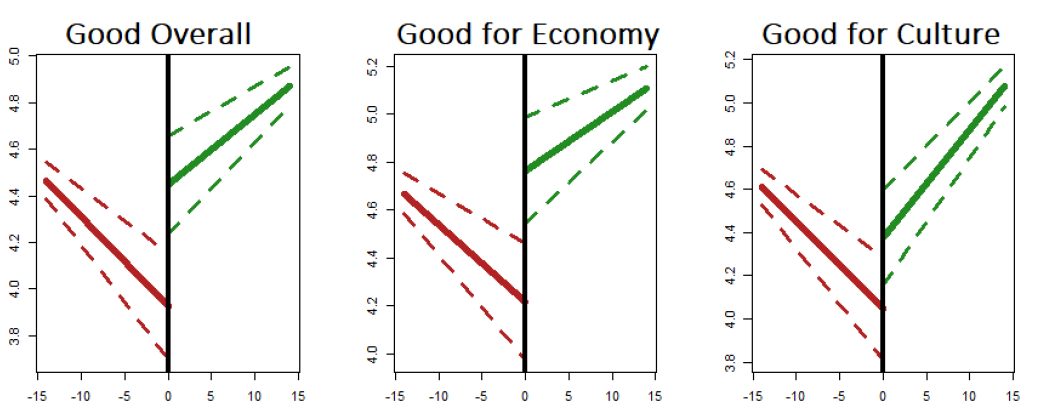International Perspectives on Attitudes Towards Immigrants
By Christopher Grady
Many factors shape attitudes towards immigrants, but recent research is discovering the important role of international politics and domestic political rhetoric. Here we review research that leverages natural experiments to capture the effect of geopolitics and elite rhetoric on support for immigrants and refugees. It shows that citizens support immigrants from international allies and oppose immigrants from international rivals, and that elites can foster support for immigrants and refugees by emphasizing shared values.
Geopolitics and Attitudes Towards Immigrants
Most research about immigration attitudes focuses on individuals, either immigrants themselves or the citizens evaluating them. A new study investigated how international relations affects support for immigrants. Deploying a survey experiment in 22 countries across five continents, researchers asked respondents to choose between a pair of applicants for permanent residency in their country. The experiment systematically varied key attributes of the two applicants, including if the applicant is from a geopolitical ally or rival.
The researchers found a strong preference for immigrants from allied nations over rivals, with this preference so pronounced that respondents favored racially dissimilar allies over racially similar rivals. Moreover, Russia invaded Ukraine during the experiment, sharpening the perception of Russia as a rival and Ukraine as an ally for many respondents. As predicted by the theory, respondents surveyed after the invasion became much more accepting of immigrants from Ukraine and much less accepting of immigrants from Russia. This research demonstrates that support for immigrants is shaped largely by the global political landscape, not just personal attributes of immigrants.
Rhetoric and Refugee Acceptance
Politicians and media often stoke anti-immigrant sentiment, but could they instead increase support for immigration? A new study examines this question in the wake of the 2021 Taliban takeover of Afghanistan, which triggered a surge of Afghan refugees to Western countries. The study first establishes that journalists and politicians spoke more, and more positively, about immigration after the Taliban takeover, emphasizing immigrants’ shared values and deservingness of help.
To determine how this positive framing affected average citizens, the study leverages a natural experiment: the Taliban takeover occurred midway through the European Social Survey, effectively randomly exposing later respondents to the pro-immigrant messaging. These respondents were substantially more supportive of immigrants, and that trend was strongest among rightwing Eastern Europeans, where politicians shifted their messaging the most positively. This research suggests that elite rhetoric matters for attitudes towards immigrants and refugees, and that messages emphasizing their deservingness and shared values can foster their public acceptance.
Attitudes towards immigrants became much more positive after messages emphasized their shared cultural values, represented by the vertical black line in each plot (Frese 2025).
TL;DR: These studies reveal that attitudes towards immigrants are not determined solely by individual characteristics, but are also influenced by external forces like geopolitics and elite rhetoric.


